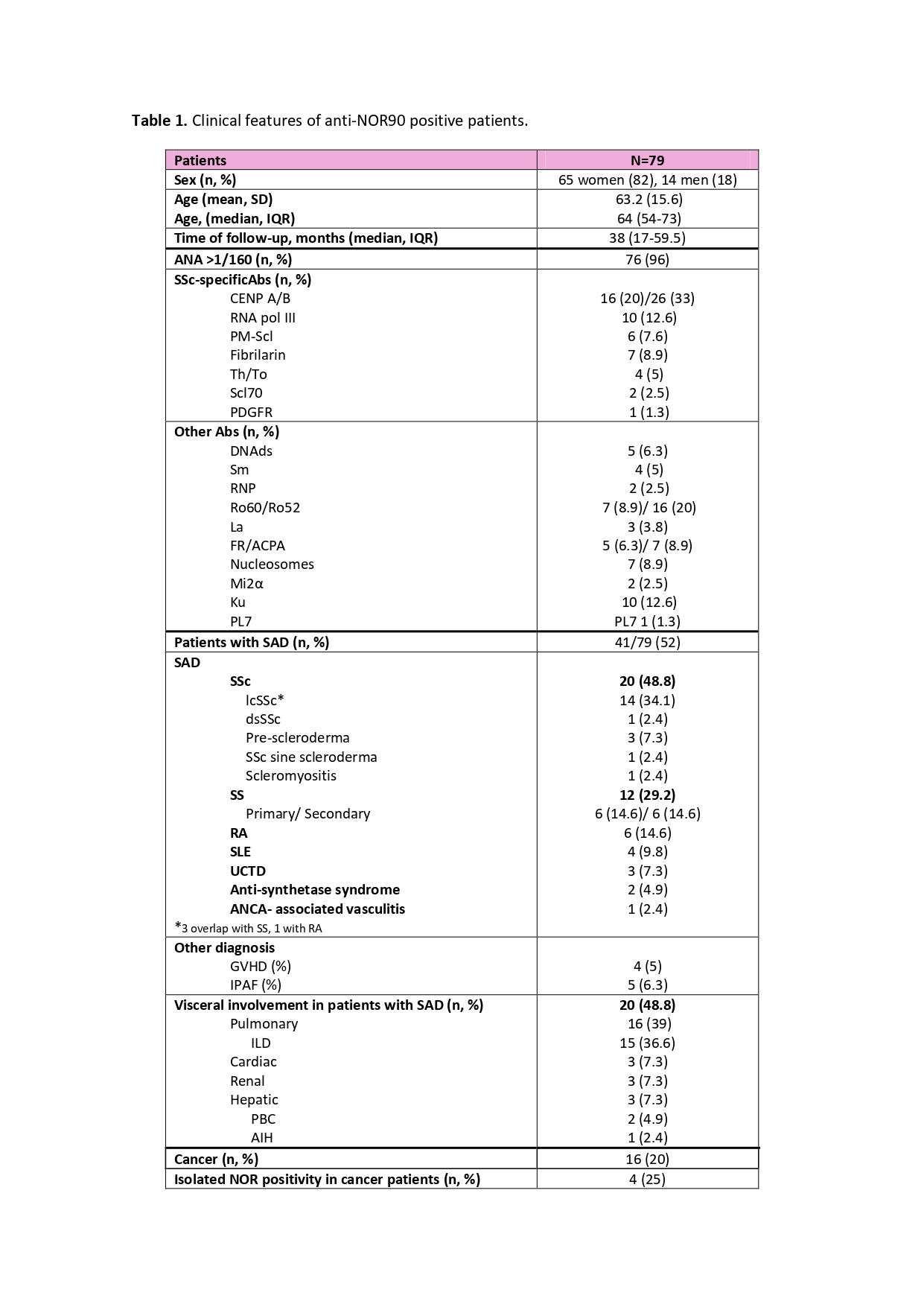Session Information
Date: Tuesday, October 28, 2025
Title: (2470–2503) Systemic Sclerosis & Related Disorders – Clinical Poster III
Session Type: Poster Session C
Session Time: 10:30AM-12:30PM
Background/Purpose: Anti-Nucleolar Organizer Region 90 (anti-NOR90) antibodies target nucleolar proteins involved in ribosomal RNA transcription and processing, key steps in protein synthesis. These antibodies have been identified in a wide range of systemic autoimmune rheumatic diseases (SAD), particularly systemic sclerosis (SSc) and Sjögren’s syndrome (SS), but also in systemic lupus erythematosus (SLE) and rheumatoid arthritis (RA)(1). Some studies have suggested an increased incidence of malignancy in anti-NOR90–positive patients, although findings are inconsistent (2)(3). Our aim was to characterize the clinical profile and frequency of autoimmune diseases and cancer in patients with anti-NOR90.
Methods: We carried out a retrospective, observational and multicenter study including anti-NOR90–positive patients attended at two tertiary hospitals in Spain between January 2013 and April 2025. Antibody detection was performed using the EUROLINE SSc Profile IgG autoAb kit (Euroimmun, Germany). Demographic, clinical, and diagnostic data were collected through electronic medical record review. Descriptive analyses were conducted using measures of central tendency (mean or median) and dispersion (standard deviation-SD or interquartile range-IQR) for continuous variables, and frequencies and percentages for categorical variables.
Results: Seventy-nine anti-NOR90–positive patients were identified (Table 1), mostly females (82%), with a mean age of 63.2±15.6 years. Median follow-up time since anti-NOR90 detection was 38 [17–59.5] months. Over half of the patients were diagnosed with a SAD, most frequently SSc (48.8%), followed by SS (29.2%). Twenty of them (48.8%) showed visceral involvement, predominantly pulmonary in the form of interstitial lung disease (ILD).The frequency of malignancy was 20%, distributed among hematologic malignancies (43.75%), non-melanoma skin cancers (18.75%), and solid tumors (37.5%). Within these cases, only one third (31.2%) had a concurrent SAD diagnosis: one limited SSc, one scleromyositis, one undifferentiated connective tissue disease and two overlap syndromes (one with SLE and one with SSc plus SS).Additionally, other autoantibodies were detected in 75% of cancer cases, most commonly anti-CENP B (41.6%), anti-Ro52 (41.6%), and anti-Ku (33.3%). Overall mortality during the follow-up was 16.4%, with 46% of deaths occurring in patients with cancer.
Conclusion: In our patients, anti-NOR90 antibodies were frequently associated with SAD and showed a notable incidence of malignancies, particularly hematologic. The presence of these antibodies may warrant closer clinical monitoring in routine practice, and larger studies should be conducted to further investigate their potential role as biomarkers for cancer risk and their clinical implications in SAD.References:1. Martínez de Victoria Carazo J, et al. Rev Clin Esp(English Ed [Internet]. 2025;225(1):51–5. Available from: https://linkinghub.elsevier.com/retrieve/pii/S22548874240013832. Yamashita Y, et al. Rheumatol (United Kingdom). 2022;61(4):1709–16.3. Hoa S, et al. Rheumatol (United Kingdom). 2022;61(7):2905–14.
 Table 1. Clinical features of anti-NOR90 positive patients (part 1).
Table 1. Clinical features of anti-NOR90 positive patients (part 1).
.jpg) Table 1. Clinical features of anti-NOR90 positive patients (part 2).
Table 1. Clinical features of anti-NOR90 positive patients (part 2).
To cite this abstract in AMA style:
Dueñas-Ochoa M, Valero C, Morandeira F, Sáez J, Nikitsina M, Roig Kim M, De Daniel Bisbe L, Vicente-Rabaneda E, Alfranca A, González-Gay M, Aguilar Coll M, Garcia Vicuña R, Narváez J, Castañeda S. High Prevalence of Autoimmunity and Cancer in Anti-NOR90-positive Patients: A Multicenter Observational Study [abstract]. Arthritis Rheumatol. 2025; 77 (suppl 9). https://acrabstracts.org/abstract/high-prevalence-of-autoimmunity-and-cancer-in-anti-nor90-positive-patients-a-multicenter-observational-study/. Accessed .« Back to ACR Convergence 2025
ACR Meeting Abstracts - https://acrabstracts.org/abstract/high-prevalence-of-autoimmunity-and-cancer-in-anti-nor90-positive-patients-a-multicenter-observational-study/
